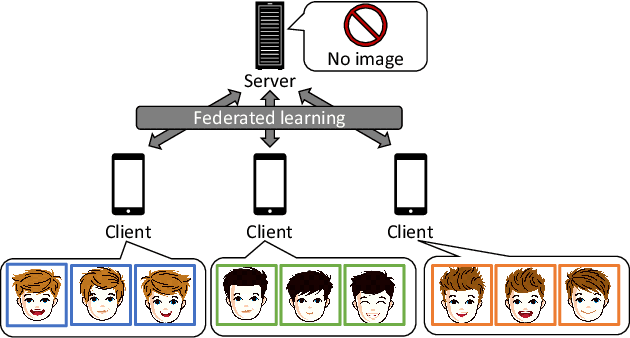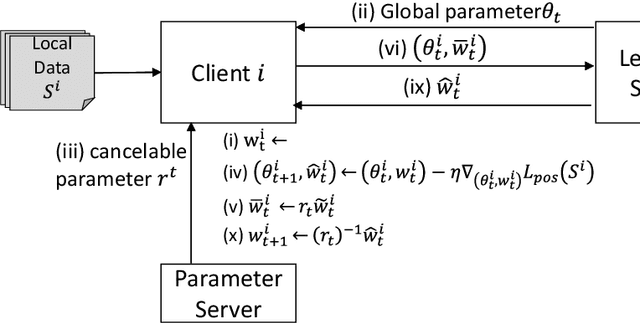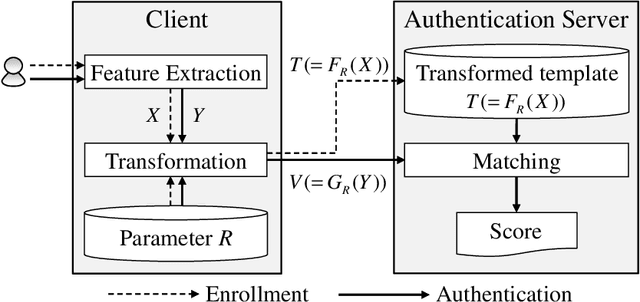Yosuke Kaga
IPFed: Identity protected federated learning for user authentication
May 07, 2024



Abstract:With the development of laws and regulations related to privacy preservation, it has become difficult to collect personal data to perform machine learning. In this context, federated learning, which is distributed learning without sharing personal data, has been proposed. In this paper, we focus on federated learning for user authentication. We show that it is difficult to achieve both privacy preservation and high accuracy with existing methods. To address these challenges, we propose IPFed which is privacy-preserving federated learning using random projection for class embedding. Furthermore, we prove that IPFed is capable of learning equivalent to the state-of-the-art method. Experiments on face image datasets show that IPFed can protect the privacy of personal data while maintaining the accuracy of the state-of-the-art method.
PDH : Probabilistic deep hashing based on MAP estimation of Hamming distance
May 21, 2019


Abstract:With the growth of image on the web, research on hashing which enables high-speed image retrieval has been actively studied. In recent years, various hashing methods based on deep neural networks have been proposed and achieved higher precision than the other hashing methods. In these methods, multiple losses for hash codes and the parameters of neural networks are defined. They generate hash codes that minimize the weighted sum of the losses. Therefore, an expert has to tune the weights for the losses heuristically, and the probabilistic optimality of the loss function cannot be explained. In order to generate explainable hash codes without weight tuning, we theoretically derive a single loss function with no hyperparameters for the hash code from the probability distribution of the images. By generating hash codes that minimize this loss function, highly accurate image retrieval with probabilistic optimality is performed. We evaluate the performance of hashing using MNIST, CIFAR-10, SVHN and show that the proposed method outperforms the state-of-the-art hashing methods.
Cancelable Indexing Based on Low-rank Approximation of Correlation-invariant Random Filtering for Fast and Secure Biometric Identification
Apr 05, 2018



Abstract:A cancelable biometric scheme called correlation-invariant random filtering (CIRF) is known as a promising template protection scheme. This scheme transforms a biometric feature represented as an image via the 2D number theoretic transform (NTT) and random filtering. CIRF has perfect secrecy in that the transformed feature leaks no information about the original feature. However, CIRF cannot be applied to large-scale biometric identification, since the 2D inverse NTT in the matching phase requires high computational time. Furthermore, existing biometric indexing schemes cannot be used in conjunction with template protection schemes to speed up biometric identification, since a biometric index leaks some information about the original feature. In this paper, we propose a novel indexing scheme called "cancelable indexing" to speed up CIRF without losing its security properties. The proposed scheme is based on fast computation of CIRF via low-rank approximation of biometric images and via a minimum spanning tree representation of low-rank matrices in the Fourier domain. We prove that the transformed index leaks no information about the original index and the original biometric feature (i.e., perfect secrecy), and thoroughly discuss the security of the proposed scheme. We also demonstrate that it significantly reduces the one-to-many matching time using a finger-vein dataset that includes six fingers from 505 subjects.
 Add to Chrome
Add to Chrome Add to Firefox
Add to Firefox Add to Edge
Add to Edge